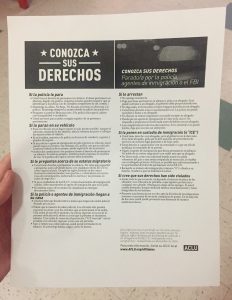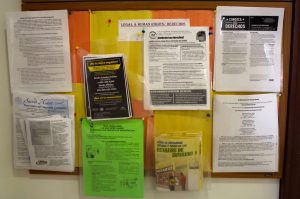By
CONOZCA SUS DERECHOS, reads the title of the flyer. Know your rights. Know what to do if the police stop your vehicle, if they ask about your immigration status, if they put you into the custody of Immigration and Customs Enforcement (ICE), if they separate you from your children.
In 2017, this legal knowledge is a matter of survival for Hispanic communities across the U.S., including Richmond. And in Jeff Davis Corridor, it’s all people are talking about at dinner tables, on the streets, and in the confines of churches and community centers, as volunteers and officials work to support Hispanic residents who otherwise would be vulnerable and uninformed about their status in the U.S.
The City of Richmond Office of Multicultural Affairs (OMA) tries to help all residents, especially immigrants, said Karla Ramos, manager of the OMA. Her office provides assistance with job applications, taxes or other paperwork; a Spanish news and lifestyle radio show; family reunification services and therapy; and classes in English as a second language.
In all this, OMA’s goal is to empower people and teach them how to live on their own, in a very strange and confusing environment in which language is just the first of many barriers. “They may understand the words, but often they don’t get it,” Ramos said.
One of OMA’s main challenges is to reassure people that the government is unlikely to come after them, Ramos said. City of Richmond police are respectful of the Hispanic community, she said, more nuanced in approach than their counterparts in Chesterfield County. After the White House announced changes in immigration policy in February, Richmond mayor Levar Stoney released a public statement to clarify that Richmond would not cooperate with ICE agents in any capacity. Leaders in Chesterfield have not commented on the subject.
“People were freaked after the election,” said Father Jack Podsiadlo, a priest at the Sacred Heart Center whose ministry is devoted to helping the Hispanic community.
For days after November 8, many Hispanic students did not go to school because their parents were afraid of legal and social repercussions, he said. Many adults are skipping evening classes in language and legal assistance because they are scared to drive undocumented at night. Even a minor traffic violation could mean deportation, they fear.
Across the street from Father Jack’s office, the Sacred Heart Center shares information about preventing deportation, and what to do if this nightmare comes true and you or a family member are detained. There are also workshops, taught by legal professionals, devoted to laws on power of attorney, to ensure that children are cared for if their parents are deported.
“We’re just not educated about the best decisions” in such situations, explained Maria G., an immigrant from Mexico.
Until now, the Hispanic community in Jefferson Davis has flourished because immigrants, when faced with the vastness and uncertainty of the U.S., move to where they have a family member or a person they know from back home in El Salvador, Honduras, Mexico or other countries. Once there, they stick together.
When such bonds are formed, it’s very difficult for the newcomer to assimilate to American culture. Most immigrants plan to go back to their home countries someday and are reluctant to give up any part of their culture in the adjustment to American life. Yet this separates them fundamentally from the surrounding city.
“Unless you really commit to the U.S., you can’t take full advantage of its opportunities,” Karla Ramos explained.
One of these opportunities is finding a job. Facebook groups exist in which members can advertise jobs that don’t require a Social Security number. The OMA cannot officially place immigrants in these informal jobs due to legal issues, but it may refer people to such pages and resources that can help.
Many men work construction and landscaping industries, and women work in house cleaning or in factories, said Podsiadlo. Many women have started successful house-cleaning businesses.
Resources exist to aid immigrant families in Jefferson Davis, but language and legal issues still stand as a huge barrier that can only slowly be broken down. For now, the dream of a welcoming, equitable Richmond is still a work in progress.



